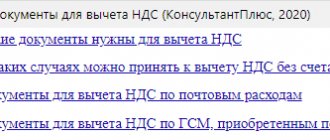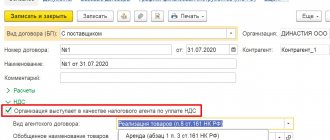In what cases do tax authorities have no right to control the market price?
Let us recall that in accordance with paragraph 1 of Art. 40 of the Tax Code of the Russian Federation, for tax purposes, the price of goods, works, and services indicated by the parties to the transaction is accepted. Until proven otherwise, this price is assumed to be in line with market prices .
The price indicated by the parties to the transaction can be challenged by the tax authority only in the cases listed in clause 2 of Art. 40 of the Tax Code of the Russian Federation, namely: for transactions between related parties; on commodity exchange (barter) transactions; when making foreign trade transactions; when there is a significant fluctuation in the level of prices applied by the taxpayer for identical (homogeneous) goods within a short period of time. Consequently, in other cases, the tax authority does not have the right to challenge for tax purposes the price of goods, works, services specified by the parties to the transaction. This is stated in paragraph 13 of the Resolution of the Plenum of the Supreme Arbitration Court of the Russian Federation No. 41, Plenum of the Supreme Arbitration Court of the Russian Federation No. 9 of June 11, 1999 “On some issues related to the implementation of part one of the Tax Code of the Russian Federation.”
In the above cases, the tax authority checks whether the price applied by the parties to the transaction deviates by more than 20% upward or downward from the market price of identical (similar) goods (works or services). If this deviation is identified, then the tax authorities have the right to charge additional taxes and penalties, calculated in such a way as if the results of this transaction were assessed based on the application of market prices for the relevant goods, works or services (Clause 3 of Article 40 of the Tax Code of the Russian Federation).
In this case, the market price is recognized as the price of a product that has developed through the interaction of supply and demand on the market of identical (and in their absence, homogeneous) goods in comparable economic (commercial) conditions (clause 4 of article 40 of the Tax Code of the Russian Federation). The terms of transactions on the market of identical (and in their absence, homogeneous) goods are recognized as comparable if the difference between these conditions either does not significantly affect the price of such goods or can be taken into account through amendments (clause 9 of Article 40 of the Tax Code of the Russian Federation).
This article provides for determining the compliance of prices used in controlled transactions with market levels, not only taking into account the comparability of economic (commercial) terms of transactions, but also subject to the established order of using methods for determining market prices , namely:
1) based on comparable market prices of identical (homogeneous) goods;
2) in the absence of transactions on identical (homogeneous) goods in the relevant goods market or due to the lack of supply of such goods on this market, as well as in the impossibility of determining the appropriate prices due to the absence or inaccessibility of information sources, the subsequent sale price method of the goods is used to determine the market price ;
3) if it is impossible to use the subsequent sales price method (in particular, in the absence of information on the price of goods, works or services subsequently sold by the buyer), the cost method is used.
When determining the market price, the provisions provided for in paragraphs 4 - 11 of Art. 40 Tax Code of the Russian Federation. They raise a lot of questions from taxpayers.
Article 40 of the Tax Code of the Russian Federation. Principles for determining the price of goods, works or services for tax purposes
Article 40 of the Tax Code of the Russian Federation with comments and amendments for 2020-2021
1. Unless otherwise provided by this article, for tax purposes the price of goods, works or services indicated by the parties to the transaction is accepted. Until proven otherwise, this price is assumed to be in line with market prices.
2. Tax authorities, when exercising control over the completeness of tax calculation, have the right to check the correctness of application of prices for transactions only in the following cases:
- 1) between interdependent persons;
- 2) for commodity exchange (barter) transactions;
- 3) when making foreign trade transactions;
- 4) if there is a deviation of more than 20 percent upward or downward from the level of prices applied by the taxpayer for identical (homogeneous) goods (works, services) within a short period of time.
3. In the cases provided for in paragraph 2 of this article, when the prices of goods, works or services applied by the parties to the transaction deviate upward or downward by more than 20 percent from the market price of identical (homogeneous) goods (works or services), The tax authority has the right to make a reasoned decision on additional tax and penalties calculated in such a way as if the results of this transaction were assessed based on the application of market prices for the relevant goods, works or services.
The market price is determined taking into account the provisions provided for in paragraphs 4-11 of this article. In this case, the usual price premiums or discounts when concluding transactions between non-related parties are taken into account. In particular, discounts caused by:
- seasonal and other fluctuations in consumer demand for goods (works, services);
- loss of quality or other consumer properties of goods;
- expiration (approximation of the expiration date) of the shelf life or sale of goods;
- marketing policy, including when promoting new products that have no analogues to markets, as well as when promoting goods (works, services) to new markets;
- implementation of experimental models and samples of goods in order to familiarize consumers with them.
4. The market price of a product (work, service) is recognized as the price established by the interaction of supply and demand on the market of identical (and in their absence, homogeneous) goods (work, services) under comparable economic (commercial) conditions.
5. The market for goods (work, services) is recognized as the sphere of circulation of these goods (work, services), determined on the basis of the buyer’s (seller’s) ability to actually purchase (sell) the product (work, service) in the market closest to the buyer without significant additional costs. (seller) in the territory of the Russian Federation or outside the Russian Federation.
6. Products that have the same basic characteristics characteristic of them are recognized as identical.
When determining the identity of goods, taking into account, in particular, their physical characteristics, quality and reputation in the market, country of origin and manufacturer. When determining the identity of goods, minor differences in their appearance may not be taken into account.
7. Homogeneous goods are those that, while not identical, have similar characteristics and consist of similar components, which allows them to perform the same functions and (or) be commercially interchangeable.
When determining the homogeneity of goods, their quality, presence of a trademark, reputation in the market, and country of origin are taken into account.
The paragraph was deleted from August 17, 1999 - Federal Law of July 9, 1999 N 154-FZ.
8. When determining market prices for goods, works or services, transactions between persons who are not interdependent are taken into account. Transactions between related parties can be taken into account only in cases where the interdependence of these persons did not affect the results of such transactions.
9. When determining the market prices of a good, work or service, information on transactions concluded at the time of sale of this good, work or service with identical (similar) goods, work or services under comparable conditions is taken into account. In particular, such terms of transactions as the quantity (volume) of goods supplied (for example, the volume of a consignment), deadlines for fulfilling obligations, payment terms usually applied in transactions of this type, as well as other reasonable conditions that may affect prices are taken into account.
In this case, the terms of transactions on the market of identical (and in their absence, homogeneous) goods, works or services are recognized as comparable if the difference between such conditions either does not significantly affect the price of such goods, works or services, or can be taken into account through amendments.
10. The clause was deleted from August 17, 1999 - Federal Law of July 9, 1999 N 154-FZ.
10. In the absence of transactions on identical (homogeneous) goods, works, services in the relevant market for goods, works or services, or due to the lack of supply of such goods, works or services in this market, as well as in the impossibility of determining the appropriate prices due to the absence or inaccessibility information sources to determine the market price, the subsequent sale price method is used, in which the market price of goods, works or services sold by the seller is determined as the difference in the price at which such goods, works or services are sold by the buyer of these goods, works or services during their subsequent sale (resale), and the usual costs in such cases incurred by this buyer during resale (without taking into account the price at which goods, works or services were purchased by the specified buyer from the seller) and promotion to the market of goods, works or services purchased from the buyer, as well as the buyer's usual profit for this field of activity.
If it is impossible to use the subsequent sales price method (in particular, in the absence of information on the price of goods, work or services subsequently sold by the buyer), the cost method is used, in which the market price of goods, work or services sold by the seller is determined as the sum of costs incurred and the usual profit for this field of activity. In this case, the usual in such cases direct and indirect costs for the production (purchase) and (or) sale of goods, works or services, the usual costs for transportation, storage, insurance and other similar costs are taken into account.
11. When determining and recognizing the market price of a product, work or service, official sources of information on market prices for goods, work or services and stock exchange quotations are used.
12. When considering a case, the court has the right to take into account any circumstances relevant to determining the results of the transaction, not limited to the circumstances listed in paragraphs 4-11 of this article.
13. When selling goods (work, services) at state regulated prices (tariffs) established in accordance with the legislation of the Russian Federation, the specified prices (tariffs) are accepted for tax purposes.
14. The provisions provided for in paragraphs 3 and 10 of this article, when determining the market prices of financial instruments of futures transactions and market prices of securities, are applied taking into account the specifics provided for by Chapter 23 of this Code “Income Tax on Individuals” and Chapter 25 of this Code “Tax on profit of organizations."
Can the tax authority check the “marketability” of the price for a one-time transaction?
Before answering this question, let us take as an example Resolution of the Federal Antimonopoly Service of the Central Election Commission dated May 20, 2009 N A62-4706/2008. The essence of the case considered in this Resolution was as follows. The organization purchased a vehicle in 2005, and two years later sold it to an individual for 50,000 rubles. According to the inspectorate, this price deviates downwards by more than 20% from the market price determined by appraisers. According to the latest data, the cost of the vehicle is about 500,000 rubles.
Since the disputed transaction was a one-time transaction, the court came to a reasonable conclusion that the inspectorate did not have the opportunity to determine the deviation of the price of the said transaction from the level of prices applied by the taxpayer “for identical (homogeneous) goods (works, services) within a short period of time.” Thus, the tax authority had no legal basis to verify the correct application of the price for the transaction in accordance with paragraphs. 4 paragraphs 2 art. 40 Tax Code of the Russian Federation .
Do the provisions of Art. 40 of the Tax Code of the Russian Federation in relation to buyers?
If the tax inspectorate manages to prove that the transaction price was underestimated, then the seller (performer) will be charged income tax and VAT . As for the buyer, he is not threatened with such sanctions (despite the fact that he received goods, works, services at a reduced price - not for free).
In cases where Art. still applies to buyers. 40 of the Tax Code of the Russian Federation and the matter comes to trial, the courts take the side of the taxpayer. Thus, the Federal Antimonopoly Service NWO, in Resolution No. A52-2867/2008 dated July 13, 2009, considered a dispute between the buyer and the tax inspectorate, according to which the organization overestimated the costs associated with production and sales by the amount of costs of purchasing goods from suppliers, which resulted in an understatement of tax at a profit. Referring to paragraph 10 of Art. 40 of the Tax Code of the Russian Federation, the inspectorate adjusted the price of transactions for the purchase of goods, thereby reducing the amount of expenses taken into account when taxing profits.
Provisions of Art. 40 of the Tax Code of the Russian Federation are used when determining the market price of goods sold by the seller, and not purchased by the buyer. Subclause 4 of clause 2 of this norm does not regulate issues related to the verification by tax authorities of the compliance with market prices established by suppliers of goods (work, services) and used by them in the sale of these goods (work, services) to taxpayer buyers.
Under such circumstances, the courts rightfully recognized the additional assessment of the organization's income tax, the accrual of penalties and fines for this episode as unreasonable.
Do the provisions of Art. 40 of the Tax Code of the Russian Federation full legal force?
In paragraph 6 of Art. 4 of Law No. 227-FZ states that the provisions of Art. 40 of the Tax Code of the Russian Federation from the moment this act came into force, that is, from January 1, 2012, applies only to those legal relations that were carried out before the entry into force of this law by firms working on the OSN.
There is a widespread point of view among experts according to which this formulation should be understood as follows: if the company does not work on the OSN, then the provisions of Art. 40 of the Tax Code of the Russian Federation are not applicable to transactions with its participation concluded before January 1, 2012.
On-site tax audits - it is during them that discrepancies in prices are identified - can be carried out within 3 years after the reporting period (clause 4 of Article 89 of the Tax Code of the Russian Federation). That is, if we adhere to the noted interpretation of the provisions of paragraph 6 of Art. 4 of Law No. 227, starting from 2015, no organization can be inspected by the Federal Tax Service in accordance with the criteria of Art. 40 Tax Code of the Russian Federation.
The structure of the Tax Code of the Russian Federation contains, as we noted above, section V.1, introduced by Law No. 227-FZ. In fact, it becomes the only source of rules related to the control by the Federal Tax Service over pricing carried out by taxpayers.
Which companies can thus be inspected by the Federal Tax Service? Which, in turn, legally become protected from the scrutiny of tax authorities?
The legislator, in combination with the provisions of the specified elements of the Tax Code of the Russian Federation (Article 40, paragraph 4 of Article 89, Section V.1 of the Tax Code of the Russian Federation) and Law No. 227-FZ, significantly limits the circle of persons whose activities the Federal Tax Service can check for the correctness of prices, and considers as such so-called interdependent subjects, as well as those equated to them.
Firms that do not belong to these categories of taxpayers are generally not subject to price audits by the Federal Tax Service. Moreover, paragraph 1 of Art. 105.3 of the Tax Code of the Russian Federation says that the legislator considers prices in transactions involving persons who are not interdependent as market prices. That is, these subjects of legal relations, based on a literal understanding of the provisions of the Tax Code of the Russian Federation, in principle do not need to prove anything to the tax authorities.
Raising the issue of legal regulation of tax control in terms of pricing, we have the right to talk about the continuity of the norms of the Tax Code of the Russian Federation. On the one hand, the provisions of Art. 40 of the Tax Code of the Russian Federation do not actually apply (if we adhere, as we noted above, to the common interpretation of the provisions of paragraph 6 of Article 4 of Law No. 227-FZ). On the other hand, we can trace the fact that some of the norms of this article of the Tax Code of the Russian Federation (for example, relating to control of prices set by interdependent firms) are reflected in other parts of the Tax Code of the Russian Federation, namely in section V.1.
Thus, from the point of view of the formation of legal grounds for the Federal Tax Service to check the prices set by Russian taxpayers, the key legal category today is the interdependence of the subjects of legal relations. What are its main criteria?
What if the official source of information contains information about average prices?
Indeed, in practice, tax authorities often use information about the average prices for a particular product, work, or service in the region. However, as a rule, if it comes to trial, judges side with the taxpayer. Determining market prices of goods for tax purposes on the basis of average prices calculated on the basis of prices prevailing on the market for identical (homogeneous) goods is not provided for in Art. 40 of the Tax Code of the Russian Federation (on this issue, see, for example, Resolutions of the Federal Antimonopoly Service of the Eastern Military District dated April 16, 2010 N A43-34094/2009, FAS Far Eastern Military District of May 21, 2009 N F03-2091/2009).
And in the Resolution of the Federal Antimonopoly Service dated May 21, 2010 N A55-19068/2009, a case was considered that the tax inspectorate lost only for the reason that, as an official source of information on average market rental prices for real estate, it used information received from the Chamber of Commerce and Industry about the size rental rates for industrial and retail space. However, the controversial lease agreement, the cost of rent for which was checked for “marketability”, provided premises for a cafe as the subject of the lease. At the same time, the tax authority did not provide any arguments regarding the legality of applying rental rates for industrial and retail space to the activities of cafes.
In another case (Resolution N A32-18922/2008 of the Federal Antimonopoly Service of the North Caucasian Region dated 11.05.2010), when applying the average cost of rent, information about the location of the premises was not taken into account (a thoroughfare street, the main highway of the city, a separate exit to a high-traffic street, etc. .), type of premises (free-standing building, built-in premises on the ground floor, basement or semi-basement premises), area and height of the premises, presence of shop windows, fire alarm system, technical and sanitary-epidemiological condition of the premises, its technical support, availability of infrastructure ( telephone, air conditioning, parking, etc.), rental period and special terms of the contract. And again the judges came to the conclusion that the tax authority violated the provisions of Art. 40 of the Tax Code of the Russian Federation for calculating the market price.






